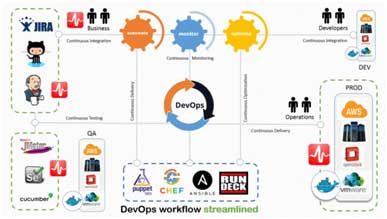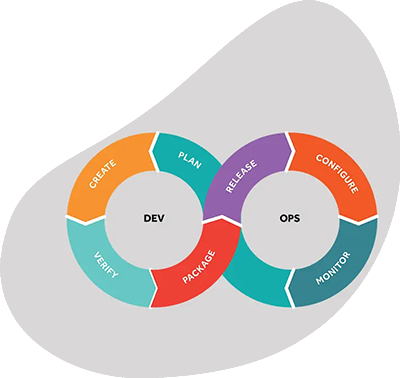Lack of tools expertise and non-compliance with best DevOps practices can create roadblocks in DevOps Transformation. Our technology expertise helps customers build, test and manage the entire software delivery life cycle.
Devops Tools & Technologies Expertise
We achieve DevOps Automation with a template-driven infrastructure, infrastructure as code, efficient VMs management, robust governance, KPI, and metrics analysis.

Stop Wasting Your Money On Maintaining Data Centers- Switch to Cloud Services Today

DevOps Overview
Impressico’s DevOps practice focuses on automation and aims to present a ‘push of a button’ solution for all things DevOps. At Impressico, DevOps is not isolated to a specific role in the organization but is an addition to the Dev/QA team. Impressico’s DevOps practice caters to the following 3 pillars:
Infrastructure As Code
DevOps engineers use Infrastructure as a code tool such as Terraform, AWS CloudFormation, Google Cloud Deployment Manager etc to automate infra provisioning and present a push of a button solution for the same. All of the above tools use JSON objects as input and we have a ready-to-use NodeJS framework which can be used to dynamically create JSON objects based on user parameters. This, in turn, can be tied to an existing CICD pipeline managed via Jenkins/CircleCI which can be added to a project’s source control so that dynamic environments can be spun up automatically on code commit/pull request approval.
Impressico also has experience in handling Infrastructure As Code using a serverless architecture so that resources only get used when they need to get used.


Terraform
Terraform is an Infrastructure as code tool created by Hashicorp which automates the provisioning of cloud infrastructure. Terraform can be used to provision infrastructure on the major public cloud providers such as AWS, GCP, Azure, Digital Ocean and more. It is written in Golang and Impressico’s DevOps engineers being adept in Golang can create custom extensions to Terraform in order to provide a customized offering.

Docker
Docker is a tool which allows developers to create Microservices and package up applications in a container which has everything it needs to function. Impressico’s DevOps engineers plan and provide multiple environments ensuring fast app deployments. Using the Multi-Stage Docker Build process, the least size is always ensured.

CloudFormation
CloudFormation is also an Infrastructure As Code tool as part of AWS offerings to provide its cloud infrastructure. It integrates well with major CI tools such as Jenkins, Travis, Circle which have ready-made plugins for the same. Impressico has created frameworks written in Python & NodeJS which automates the generation of Cloudformation templates which in turn can be easily tied in existing/new CICD pipelines.

Kubernetes
Kubernetes is a tool which is used for Docker orchestration and takes care of networking and service discovery. It also comes with self-healing and scaling features which allows 100% uptime of applications. Impressico’s DevOps Engineers make use of Helm Charts to deploy and run docker images on Kubernetes. Kubernetes also ties in effortlessly with all the major cloud providers such as AWS, GCP, Azure etc.

Packer
Packer is a multi-utility tool created by Hashicorp that provisions infrastructure in the form of virtual images, docker images, etc. It is a great tool that can be used to build out/configure virtual machines/servers and always have an update ready to use an image available. It ties in seamlessly with configuration management tools such as Chef, Puppet, Ansible, Salt, etc.

CI/CD As Code
CICD is an important part of the SDLC and helps ensure the right code moves on between environments at the right time. We recommend the use of Jenkins as its CICD tool and use Groovy to write said pipelines. Impressico has ready to use Groovy Libraries which can be used to easily manage CICD pipelines. These pipelines are a part of project source control and can be triggered automatically on a code commit/pull request approval.

Jenkins
Jenkins is a CICD tool which can be used to schedule/perform CICD activities by creating deploy pipelines. Using Apache Groovy, Impressico’s DevOps Engineers create scripted and declarative pipelines using either a DSL provided by Jenkins or by creating custom functional resources. Jenkins, in turn. is used for automating the Build and Release process while employing various DevOps tools in turn.

Automated Testing
Testing is an integral part of the SDLC and now with tools available to automate it, it has also become a vital part of a successful DevOps practice. Using CI Tools such as Jenkins, Travis, Circle Impressico’s DevOps Engineers integrate the automated unit tests and test cases to initiate as soon as something is deployed. Results are sent via a chosen communication channel and the suites are designed intelligently to revert to an old state if the test fails.

Configuration Management
Configuration Management is an integral part of a successful DevOps practice. When deploying applications to multiple environments one has to understand that environments need to be ephemeral and multiple. Impressico’s DevOps Engineers make use of Configuration Management tools such as Ansible, Chef, Puppet, Salt to create dynamic configuration files, install packages, manage security etc.

Build and Release
Monitoring As Code
We can help automate various monitoring tools such as LogicMonitor, New-Relic, Splunk, pager-duty so that MOC can intelligently route requests to correct on-call support.


New Relic
New Relic is a web application performance service designed to work in real-time with a live web app. New Relic Infrastructure provides flexible, dynamic server monitoring. Infrastructure empowers modern operation teams to make intelligent decisions about complex systems

DataDog
Datadog is the leading service for cloud-scale monitoring. Datadog helps IT, operations and development teams who build and run applications on dynamic or high-scale infrastructures. Datadog collects metrics and events out of the box, including other monitoring tools

Splunk
For IT teams adopting DevOps, Splunk software helps improve velocity, quality and the business impact of app delivery. Unlike other solutions that focus on discrete release components, Splunk provides real-time insights across all stages of the delivery lifecycle.

LogicMonitor
LogicMonitor’s SaaS architecture easily fits into your existing IT environment, a little configuration is required and there is a minimal tax on your IT infrastructure overhead. It automatically recognizes devices in your infrastructure and immediately begins collecting performance metrics.

PRTG
PRTG is a central component of networking monitoring. It is used to monitor the state, health, and performance of everything from servers to networking devices.
Alerts generated in PRTG can trigger incidents in PagerDuty, to alert the appropriate technician via SMS, phone, email or push.